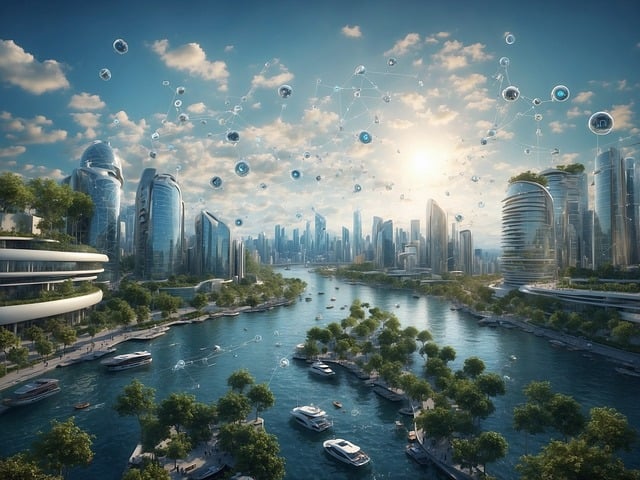Landscapes enhance human well-being but can cause ecological damage if not managed responsibly. Traditional practices lead to water pollution, soil erosion, and habitat disruption. AI-driven drip irrigation optimization engines offer a sustainable solution by leveraging data analytics and machine learning for precise water delivery directly to plant roots, reducing waste and runoff. Integrated with smart sensors, these systems enable real-time adjustments, fostering efficient and eco-friendly landscaping while promoting resource conservation. AI technology is transforming water management with its advanced drip irrigation optimization engines, offering an eco-friendly and cost-effective approach to sustainable landscaping practices.
In today’s digital era, sustainable landscaping is more crucial than ever. This article explores how Artificial Intelligence (AI) can revolutionize eco-friendly practices in the face of climate change and environmental degradation. We delve into the profound impact of traditional landscaping on ecosystems and present innovative solutions for runoff and erosion prevention through AI-driven drip irrigation optimization engines. By harnessing cutting-edge technology, we aim to foster a greener future.
- Understanding the Impact of Landscaping on Ecosystems
- The Role of AI in Optimizing Drip Irrigation for Sustainable Practices
- Preventing Runoff and Erosion: Innovative Solutions with AI Technology
Understanding the Impact of Landscaping on Ecosystems

Landscapes, while beautiful and essential for human well-being, can significantly impact local ecosystems if not designed and maintained responsibly. Traditional landscaping practices often contribute to environmental issues such as water runoff, soil erosion, and habitat disruption. Runoff from paved areas and inefficient irrigation systems can contaminate nearby water bodies, disrupting aquatic life and ecological balance. Soil erosion, accelerated by improper landscaping, leads to the loss of topsoil, a vital component for plant growth and ecosystem health.
AI-driven drip irrigation optimization engines offer a promising solution to mitigate these issues. By leveraging machine learning algorithms and data analytics, these engines can analyze various factors like weather patterns, soil moisture levels, and plant requirements to deliver precise amounts of water directly to plant roots. This targeted approach reduces water waste, minimizes runoff, and ensures plants receive the optimal hydration they need. Moreover, AI-optimized drip irrigation systems can be integrated with smart sensors and automated controls, enabling real-time adjustments based on changing environmental conditions, thus fostering sustainable landscaping practices.
The Role of AI in Optimizing Drip Irrigation for Sustainable Practices

In the pursuit of sustainable landscaping, every drop of water counts. Artificial Intelligence (AI) is transforming traditional irrigation practices by revolutionizing how we manage water in our outdoor spaces. AI drip irrigation optimization engines use advanced algorithms to analyze various factors like weather patterns, soil moisture levels, and plant requirements. This data-driven approach ensures that water is delivered precisely where needed, reducing waste and optimizing growth.
By learning from historical data and real-time feedback, these intelligent systems can adjust watering schedules dynamically. This means plants receive exactly the right amount of water, minimizing runoff and erosion while promoting healthy development. Such precision agriculture not only conserves resources but also contributes to a greener, more eco-friendly landscape design.
Preventing Runoff and Erosion: Innovative Solutions with AI Technology

Preventing Runoff and Erosion: Innovative Solutions with AI Technology
In the quest for sustainable landscaping, managing water runoff and mitigating erosion are paramount to preserving our environment. Traditional methods often fall short in addressing these challenges effectively. However, Artificial Intelligence (AI) is revolutionizing this domain through advanced drip irrigation optimization engines. These intelligent systems analyze real-time data on soil moisture levels, weather patterns, and vegetation needs, ensuring precise water distribution. By minimizing excess water flow, AI-driven solutions reduce runoff, preventing erosion and preserving the integrity of landscapes.
Moreover, these AI technologies adapt to changing conditions, optimizing watering schedules and patterns. This not only conserves water but also fosters healthier plants by avoiding both over- and under-watering. As a result, smart irrigation systems powered by AI contribute significantly to sustainable landscaping practices, offering efficient solutions that are both eco-friendly and cost-effective.
AI offers a promising path forward for sustainable landscaping, particularly through its application in drip irrigation optimization engines. By understanding the impact of landscaping on ecosystems and leveraging innovative solutions, we can prevent runoff and erosion while fostering healthier, more resilient environments. Integrating AI technology allows for data-driven decisions that promote efficient water use, reduce environmental impact, and contribute to a greener, more sustainable future.
